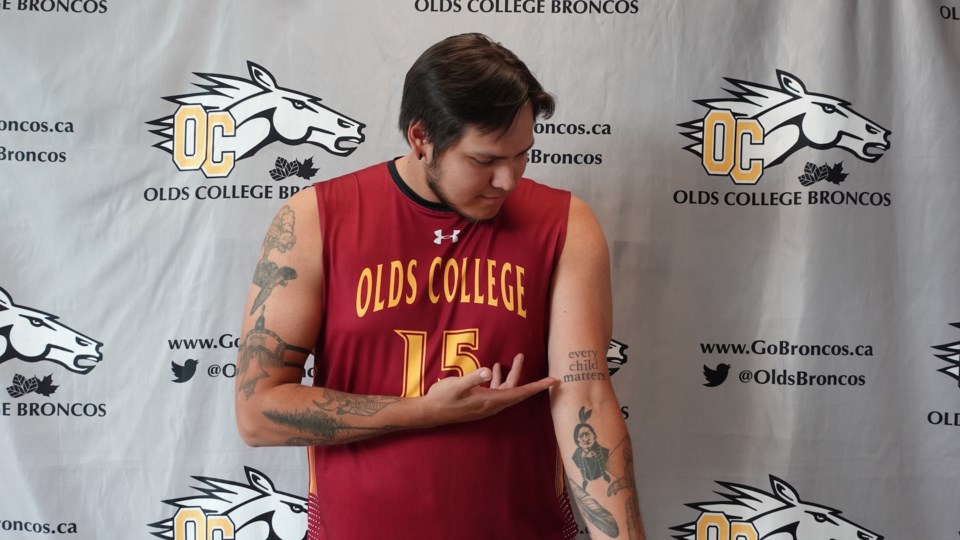OLDS — Growing up in Manitoba’s Peguis First Nation, Phillip Sutherland estimates he was about 11 or 12 when he first learned of the atrocities committed within Canada’s residential school system, with the last school only having closed shortly before he was born.
Those stories were further ingrained in his mind as he listened to stories from Elders about their experiences in the system, then further cemented after Phyllis Webstad shared the story of her orange shirt.
Now 24, Sutherland finds himself as a voice to speak on the mistreatment of Indigenous people as a member of the Olds College Broncos men’s volleyball team, one of four teams that recently participated in the Broncos’ second Orange Shirt Day initiative of the season on Nov. 5.
“When we first got here, it was like a brand new thing,” Sutherland, whose grandparents went through the residential and day school systems, said of the initiative.
“A lot of the guys on the team didn’t know more in-depth about the residential school system, or what intergenerational trauma was, and how it affects people, or just in general, the idea of having that trauma passed down from grandparents to parents to child.”
Sutherland was one of five Indigenous players on the men’s volleyball Broncos when he first came to Olds in 2019 along with Dawson Jimmy, River Thomas, and Thundersky and Ryzen Walkingbear.
Sutherland admitted to being unsure of how to approach the new sense of awareness at first.
“We didn't really know what was OK to talk about, or what was too far, or what was too far for even us,” Sutherland said.
“Over the years, it’s gotten to be more accepted, in a way, without making people feel really uncomfortable as to what happened at the schools, or even just personal experiences with intergenerational trauma.”
Though he’s the last of that group to still be a Bronco, he’s noticed growth within the rest of his team as they’ve grown up together, noting that the change started with off-court activities.
“Over the years, we’ve really taken a lot of time and effort to get a better understanding, and the thing that makes it more impactful is that the guys I came in with, they have it embedded in their minds about what this day means to a lot of Indigenous people and Indigenous nations,” he said.
While Sutherland is very much part of the Broncos community to the point of being an ACAC South All-Conference middle blocker last season, the community where he lived until he was 18 was also important in shaping his life as he learned more about what happened over several generations.
"Having heard the stories about the schools and doing your own research about it, you get an understanding and you start to see what intergenerational trauma really is before it affects you,” Sutherland said.
“I love my home, I love my family, I love where I come from, but a lot of stuff back home is affected because of these schools.”
Sutherland has opened up about these stories on multiple occasions, including to a number of Broncos student-athletes during Truth and Reconciliation Week at Olds College at the end of September.
He spoke of how it will take multiple generations for reconciliation to truly occur, noting that the wounds are still fresh as he’s part of the first generation out of the residential school era.
While he admitted to not knowing what it will take to reach reconciliation, Sutherland believes there is a path forward.
“I totally believe that people can change if they choose to self-educate,” he said.
“I love talking to people about it who are willing to learn, but they have to understand that self-education is going to play a big factor, because for a lot of people, especially for the older generations who have been to the schools, it’s going to be hard to even bring it up because it can reopen past traumas.”
This article, edited by the Albertan, was written by Olds College sports Information and Esports coordinator Geordie Carragher.



